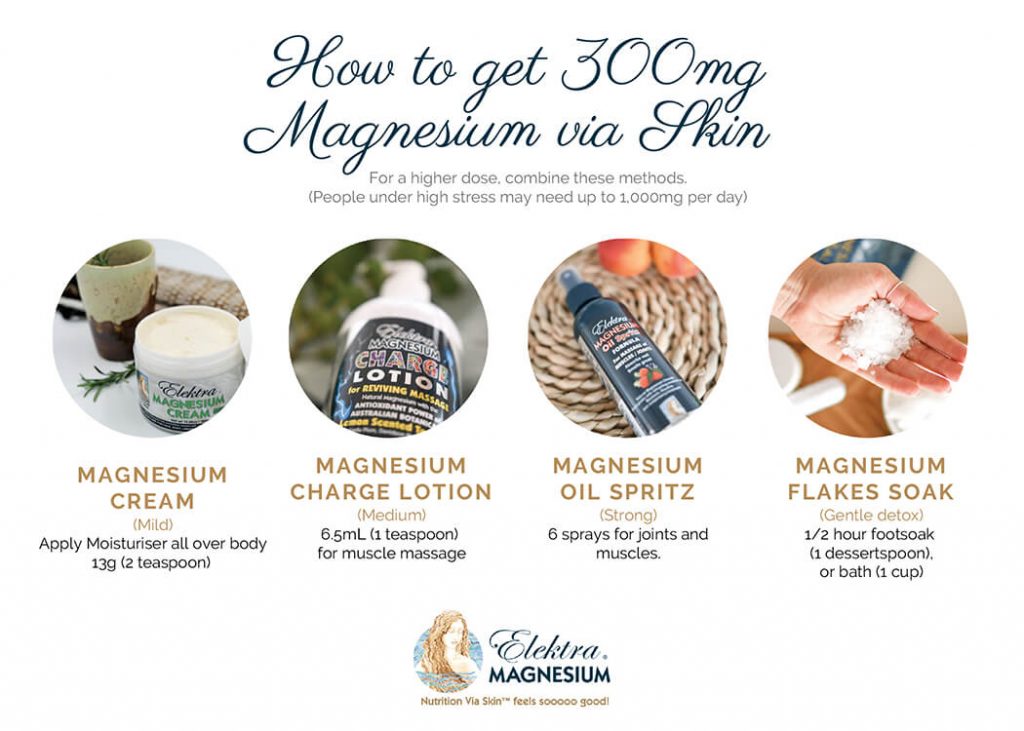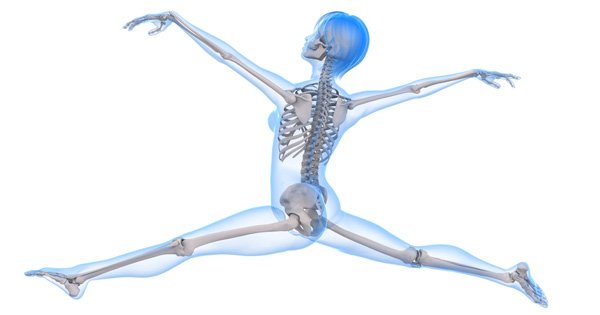Many people have become obsessed with the notion that lack of calcium causes osteoporosis. Yes, calcium and osteoporosis are related, however the bones are made up of a myriad of different minerals that come together to make healthy and strong bones. We have been collectively ‘taught’ by dairy industry advertising since last century that calcium is the mineral that prevents osteoporosis. This is simply not true. What bones need is good balance of minerals , with the presence of calcium in the right proportion. In fact, if you overdose on calcium you can create serious complications and side effects – namely the suppression of magnesium.
Osteoporosis can be prevented with adequate magnesium and good diet
Osteoporosis is a disease prevalent in the aged, where the weakening of bone increases the risk of breakage. It can be preceded by an intermediary stage in younger people called ‘osteopenia’. Osteoporosis generally increases over time as we age, but some people can be more prone to this degeneration than others. A lot depends on nutrition, including adequate magnesium, exercise and sunshine.
By the time you get osteo symptoms, the disease has been well and truly advancing for many years. Ideally we need to be paying attention to proper diet and lifestyle long before osteoporosis symptoms show up. Medications cannot fill the void of good nutrition and plenty of magnesium. But take heart, it’s never too late to make the good changes. It just takes longer to correct the problems. Start now and feel the difference!
Magnesium also alleviates arthritic pain and inflammation

In osteoporosis, “Bones that commonly break include the vertebrae in the spine, the bones of the forearm, and the hip. Until a broken bone occurs there are typically no symptoms. Bones may weaken to such a degree that a break may occur with minor stress or spontaneously. After a broken bone, chronic pain and a decreased ability to carry out normal activities may occur.” (Wikipedia) We have been told since last century that consuming more milk ensures bones remain strong and avoid osteoporosis. Milk typically contains 12% calcium, but only 2% magnesium. Does drinking more milk reduce the risk of osteoporotic hip fractures? You may be surprised to find The Harvard Nurses’ Health Study of 77,761 women, aged 34 to 59 followed for 12 years, found that those who drank three or more glasses of milk per day had no reduction in the risk of hip or arm fractures compared to those who drank little or no milk, even after adjustment for weight, menopausal status, smoking, and alcohol use. In fact, the fracture rates were slightly, but significantly, higher for those who consumed this much milk, compared to those who drank little or no milk. This is likely due to the antagonism of calcium and magnesium, and that when calcium is high and magnesium is low, bones become dryer and more brittle.
Magnesium is the controller of bone cell turnover by reducing free radical damage and the risk of osteoporosis
Sodium, potassium, zinc, phosphorus, iron, strontium, manganese and silica are some of the other bone minerals required, together with calcium and the very important magnesium. Bones go through a constant dynamic remodelling and resorption process whereby bone marrow stem cells are created and then move slowly to the outside of the bone, becoming harder as they migrate outwards. Magnesium is the controller of cell proliferation and turnover. Studies have shown that magnesium deficiency has a corresponding effect of increased Reactive Oxygen Species (ROS) – causing oxidative stress and free radical damage. This energetic stress triggers an increase in stem cell production in anticipation of a crisis in loss of bones cells due to oxidative damage. But as magnesium is physiologically increased in the body, the stem cell stress response settles down again to recover and stabilise. This demonstrates that magnesium is essential for controlling and mitigating oxidative stress, thereby regulating and controlling cell proliferation and turnover. As magnesium counteracts oxidative stress of bone cells, it also reduces the propensity to develop osteoporosis.
In addition to the minerals that make up bones, the organic matrix is also an integral aspect of bone quality and health. “Collagen makes up 90% of the organic matrix of bone. Type I collagen fibers twist around each other in a triple helix and become the scaffold upon which minerals are deposited.”
Magnesium is essential in the production of collagen and elastin. In fact, good bone health requires antioxidant support from magnesium, as well as B group vitamins, vitamins C, E, K and D. Oxidative stress and acidosis can cause dissolution and degeneration of the bone matrix by corrupting protein structures and causing leakage of valuable minerals – which is why nutrition plays such an important part. Acids (free radicals) dissolve our bones faster – which becomes more obvious when you look at what acids do to teeth!
A doctor in India told me that, to his great surprise, the increase in magnesium in the body actually alleviated symptoms of apparent calcium deficiency that had been diagnosed. This is because it is the magnesium ion that gets low in cells before the other electrolyte partners present deficiency symptoms. Magnesium is the Master Mineral Electrolyte due to its primary role in the production of ATP (adenosine triphosphate) electrical energy batteries of cells. It provides the electrical supply that all processes in the body need to function: A literal power point and charging mechanism!

Bones can leak out too much calcium via excess parathyroid hormone as magnesium levels get lower. This is because magnesium deficiency leads to acidosis, which makes the body pull calcium from bone stores, and consequently over time results in osteoporosis. Parathyroid hormone (PTH) draws calcium out of the bones and deposits it in the soft tissues when cells suffer too much oxidative stress and cannot appropriately recover. However, magnesium helps to increase calcitonin, which increases calcium uptake in bones, instead of calcium depositing in soft tissues like ligaments, joints, kidney tubules and arterial linings, making them stiffer and less flexible. Calcium deposits in arteries also push up the blood pressure. Magnesium therefore determines this delicate and important balance of how calcium is used in the body. The prevalence of oxidative stress, acidosis, hypercalcemia and osteoporosis indicates chronic magnesium deficiency.
During oxidative stress calcium can leach out of bones and enter the blood as free calcium, causing blood to thicken and arterial linings to stiffen. This leads to hypertension and cardiovascular disease. Magnesium however can exert a cardio-protective and blood-pressure normalising effect due to its electrolyte charge and calcium-channel blocking capacity. It increases blood fluidity (zeta potential), acting as a natural and effective anti-thrombotic with no negative side effects!
A wonderful way to relax into a better sleep, as well as to detox, is to have a half hour footsoak with a tablespoon of magnesium flakes just before bedtime. The feet are very good at absorbing magnesium from the hot water, as well as releasing toxins and wastes from the skin. This lifts the load on kidney and liver and also helps calm the heart.
Magnesium is required to synthesise proteins, which are structures made up of amino acid building blocks. Enzymes, hormones, collagen structures, membrane channels are all proteins. Ribosomes are the sites in a cell in which protein synthesis takes place. The rRNA molecules within the ribosome, using magnesium, direct the catalytic steps of protein synthesis.
Collagen and elastin structures are made of proteins which also form our integumentary system of skin, hair, nails, teeth, bones and ligaments. In magnesium deficiency it is common to see deterioration in these collagen structures, whereby they can lose flexibility, strength and structural organisation. Loss of magnesium from cells leads to increase of calcium as well as dehydration, hardening and stiffness.
Magnesium, together with vitamin K2, brings into the bone mineral matrix not only calcium for hardening, but also more hydration, as well as elastin for shock absorbing cartilage. Calcium without enough magnesium leads to dryer and more brittle bones. Magnesium also helps clean up calcium deposits from our soft tissues, eliminating some forms of arthritis, stones or bone spurs. It increases movement, flexibility and circulation. Low magnesium leads to calcium deposits in ligaments, which inhibit flexibility, making them more brittle and prone to injury. We therefore age prematurely when magnesium deficient, getting stiff, hard and crunchier faster!
Magnesium is also essential in the synthesis and use of vitamin D (actually a hormone), which is necessary for calcium utilisation. The best form of vitamin D is the one the body makes naturally from exposure to sunlight on skin, which contains magnesium and a healthy cholesterol-fat content. Magnesium Cream works a treat to lubricate dry skin and give it the nutrients essential for manufacture of vitamin D. If you don’t have access to sunshine, then try cod liver oil or other fatty fish, egg yolks, butter etc.
Not only do bones suffer from magnesium deficiency (more than calcium deficiency), but other collagen scaffolding such as in skin, nails and hair can also lose structure and functionality. If skin loses collagen structure it loses protection from the environment because it won’t be able to hold as much oil and moisture. Osteoporosis is often accompanied by degeneration of skin health.
If skin becomes collagen depleated it opens the skin barrier to vulnerability of inflammation and infection by pathogenic microorganisms. The slightly acidic (normal) pH barrier protection becomes disturbed and symptoms of psoriasis, eczema and dermatitis can flare up as the immune system is triggered. Low magnesium status makes the body more hyper-sensitive to inflammatory responses and we become primed to an immune response with only a slight provocation.
If you are prone to these kinds of symptoms you will also notice that flare-ups mostly occur after excessive stress conditions such as sleep deprivation, over-working without sufficient rest recovery, or emotional traumas.
It always comes back to the same thing: Stress depletes magnesium, which causes oxidative damage and acidosis, energy deficit, weak immune system, cell pollution and calcium dysfunction.

Be wary of excessive calcium (hypercalcemia)
One must be mindful of taking synthetic supplements and make sure one nutrient doesn’t push another out of the way. Strategies like adding more calcium or vitamin D tablets to your diet may not necessarily alleviate your symptoms, but could make them worse due to calcium antagonism of magnesium. Calcium can become a bully if magnesium is low and calcium is high. The calcium we need can be easily supplied by diet with green leafy vegetables, nuts, seeds, bone broth, legumes and dairy. But it’s magnesium we tend to run short of more often, because it is not so readily available from foods anymore, we may have gut issues that hinder digestion, or the kidneys may lose magnesium excessively under stress.
Keeping the spring in your step with transdermal magnesium (via skin)
In the crisis of a heart attack or immediately after cardiac surgery doctors may administer intravenous magnesium to avoid heart arrhythmia. This is recommended because such traumas trigger a massive release of magnesium via the urine, leading to severe magnesium deficiency, which increases the risk of arrhythmia or thrombotic events. Something bad can get a whole lot worse without enough magnesium handy! It works quickly to calm down adrenaline fueled hyperactivity and irregular heart beats.
However, perhaps you may like to avoid the necessity of such drastic interventions by not developing heart disease in the first place. A successful lifestyle protocol involves steps to ensure our diet contains high levels of magnesium, antioxidant plant foods, as well as mindful lifestyle practices avoiding stress and conserving excessive magnesium loss.
When gut health and digestion is impaired the best way to absorb large amounts of magnesium as needed, is transdermally. Magnesium chloride salts, once dissolved, are already in the right form for cellular uptake. You can enjoy a calming and relaxing magnesium footsoak or bath three times a week or more. Food grade magnesium chloride can also be added to filtered drinking water (ie. non-fluoridated).

Other ways to incorporate natural magnesium supplementation is by using magnesium body care products such as Magnesium Cream, Magnesium Lotion and Magnesium Oil. The presence of lipids assists the absorption of the magnesium salts via skin. For example, in the case of dry or sensitive skin it is recommended to lubricate the skin first with Magnesium Cream, as it acts as a superior moisturiser and anti-ageing cream (bonus!).
Stronger solutions such as magnesium oil can be additionally applied to increase the dose for acute conditions, pain relief and relaxation of tight muscles, ligaments and joints with a gentle massaging action. If you are feeling any kind of tremors or muscle twitches, just apply a generous amount to that area and massage in to relax the muscle.
Daily use of transdermal magnesium also promotes better sleep. Have a magnesium soak and apply magnesium skin care just before bed for best results. Apply magnesium cream in the morning for skin conditioning and protection, and a daily magnesium boost. Significant amounts of magnesium can be naturally absorbed via skin, which has been confirmed in a number of studies.
There is no limit to how much can be used transdermally because the body is in control and transdermal absorption is a self-regulating system. The nutrients just sit inside the epidermal layer, as in a storage reservoir, until the body is ready to take them up. AND, the beneficial side effect is great skin condition!

Magnesium delivers a calmer, stronger and more focused energy metabolism. It counteracts oxidative stress, which promotes better cardiovascular health, bone strength, flexibility – and not to mention mental acuity! Magnesium simply helps to keep us younger, more flexible and juicier longer! They don’t call it ‘the anti-ageing mineral’ for nothing.
By Sandy Sanderson © 2020 www.elektramagnesium.com.au




